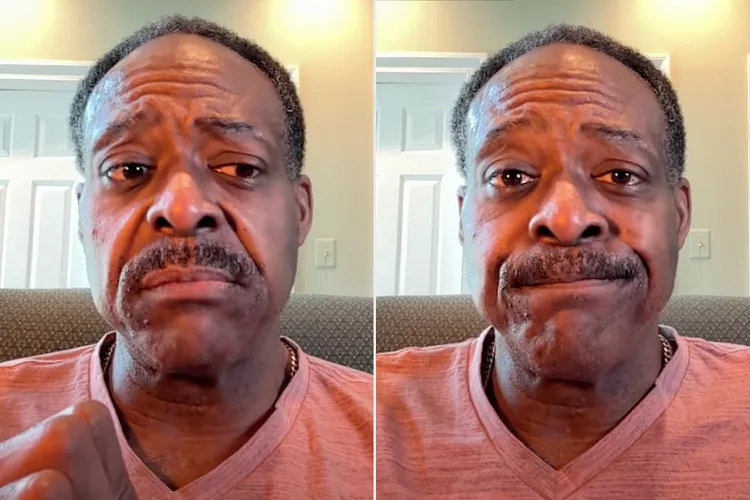Former Anchor Opens Up About On-Air Stumbles
[btnsx id=”5768″]
Leon Harris tells Daryn Kagan, his former CNN colleague, that his on-air stumbling episode was embarrassing, but that ultimately, the day might have been liberating for him. (Credit: YouTube)
Former Anchor Opens Up About On-Air Stumbles
“Leon Harris is opening up about his struggles and his mistakes” Rachel McRady reported Thursday for People magazine.
“The former NBC4 Washington anchor concerned viewers back on Thanksgiving, when he appeared to be struggling to get through the live broadcast. Clips of Harris stumbling as he read the teleprompter and appearing to slur his words circulated on the internet in the wake of the incident.
“Several months later, it was announced that Harris would be stepping down from his role at NBC4 to focus on his health.
“Now, in a new interview with his friend and former colleague Daryn Kagan on her Call Me Friend podcast, Harris shared what really happened that day.
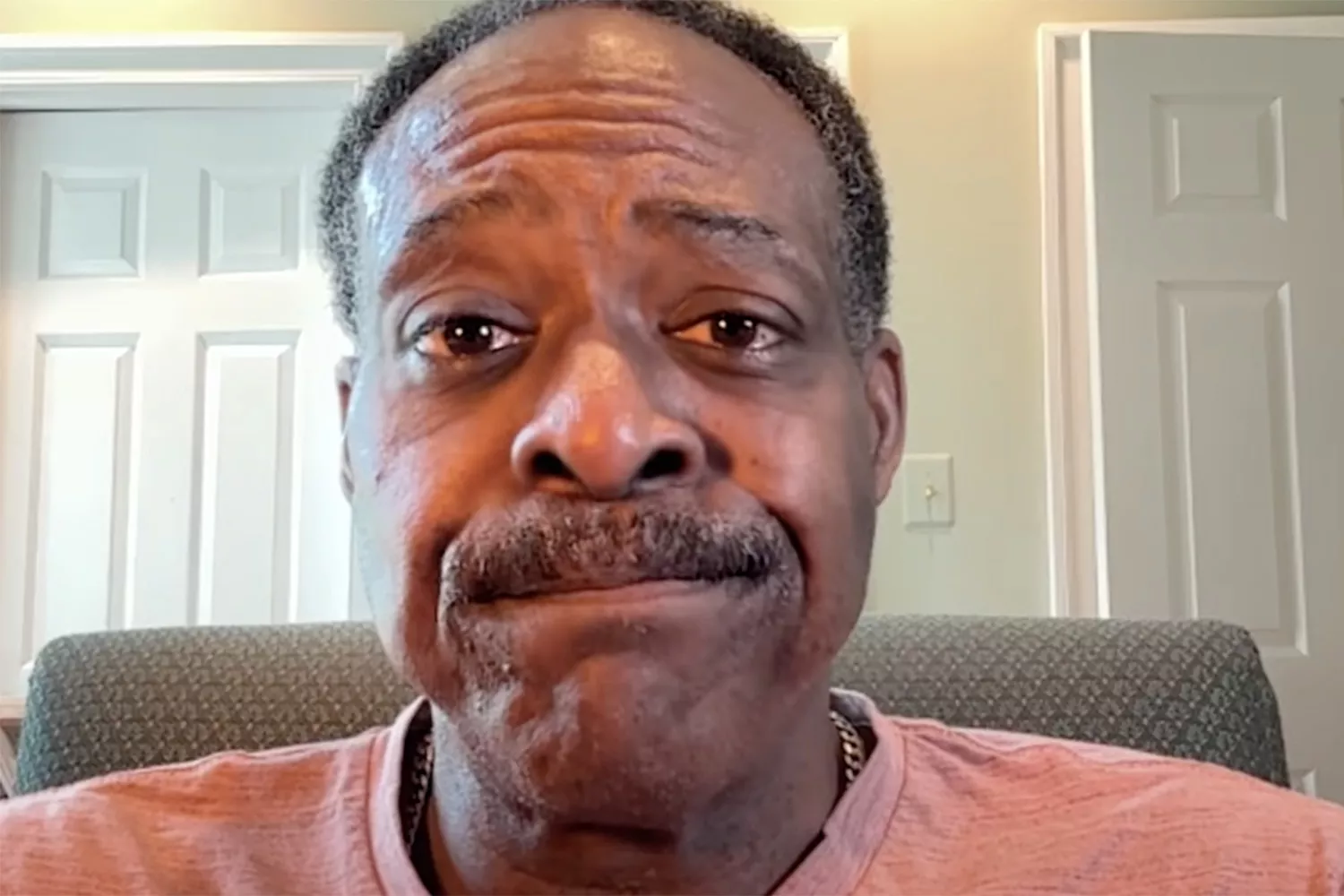 “During the interview, which was released on Wednesday, May 14, Harris admitted that he’d had a meal and a ‘couple glasses of wine’ before going on the air. (Photo: Still shot from podcast.)
“During the interview, which was released on Wednesday, May 14, Harris admitted that he’d had a meal and a ‘couple glasses of wine’ before going on the air. (Photo: Still shot from podcast.)
“However, after past alcohol issues, Harris said that he could no longer drink the way he used to without negative repercussions.
“ ‘I ended up drinking between shows, and I went on the air,’ he shared. ‘I was more affected than I thought I was. Even at the time, I felt like I was perfectly fine.’
“But after numerous viewers called in expressing their concern for Harris, he said he was ‘pulled off the air.’
“ ‘People were calling. They were thinking that I was having a stroke,’ he said. ‘It was the most embarrassing thing that has ever, ever happened to me.’
“Shortly after, Harris went to rehab to continue what he referred to as his ‘battle with alcoholism.’
“The longtime broadcast journalist knows that the clips spread widely online, saying on the podcast, ‘I’ll never be able to live down or get away from it.’
“Not only did the moment affect his professional life, Harris said it’s also impacted him ‘domestically,’ though he didn’t elaborate further. The former Washington, D.C.-based anchor is married to Dawn Harris and shares two adult children with her.
“Despite the embarrassing moment, Harris said that the day ‘may have been liberating’ for him.
“ ‘Having that job and having the status and the responsibilities that came with it, actually may have been part of the reason I was drinking,’ he said, reflecting on the pressure he felt in the role. . . .”
If you or someone you know is struggling with substance abuse, please contact the SAMHSA helpline at 1-800-662-HELP.
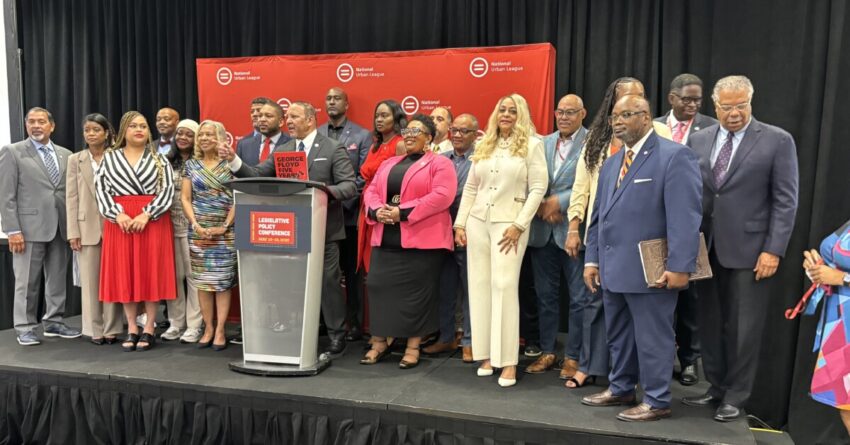
Marc Morial, president and CEO of the National Urban League, and colleagues address the need for diversity, equity and inclusion at the group’s Legislative Policy conference in Washington, (Credit: Richard Prince)
Diversity Allies Want Black Press, NABJ to Join
May 15, 2025
J-Groups Missing from ‘Demand Diversity’ Coalition
Homepage photo: Marc Morial, president and CEO of the National Urban League, and colleagues address the need for diversity, equity and inclusion at the group’s Legislative Policy conference in Washington, (Credit: Richard Prince)
[btnsx id=”5768″]
At 29:04 in this video, National Urban League CEO Marc Morial responds to a question from Journal-isms about whether he would like to have media representatives in his coalition, and what he sees as the role of the media in the diversity advocates’ efforts. (Credit: YouTube)
J-Groups Missing from ‘Demand Diversity’ Coalition
National Urban League President Marc Morial said Thursday that his coalition of 20 or so groups fighting to continue diversity, equity and inclusion policies is “trying to figure out a way to include” the National Association of Black Journalists and the trade group for Black-press publishers, the National Newspaper Publishers Association.
The National Hispanic Media Coalition is a member, but not the National Association of Hispanic Journalists.
Morial made the statement in response to a question at the group’s Legislative Policy Conference in Washington, attended by about 400 people. The group released two reports, “George Floyd Five Years Later — Was It a Moment or a Movement?” and “The Main St. Tax Initiative.“
“Journalists are storytellers,” Morial said. “And in this moment, also, our journalists in our community are truth-sayers. And it is so important in this moment that all of us find ways to lift our voices. Individuals can do it through social media. Those that have the pen in their hand, the proverbial pen in their hand, can write about this moment.
“See, I think the headlines have grabbed those companies that have retreated. There needs to be attention on those that have not.
“Because those that have not — now some of them don’t want a lot of attention. But we want to shine a light on it because it is a mixed result.
“I’m disappointed with anyone that would walk away, because some that have walked away have whispered to me privately, ‘You know I’m only doing this because of the threat. So I’ve got to do this only because of the threat.’ And this is a commentary on the erosion of American democracy.
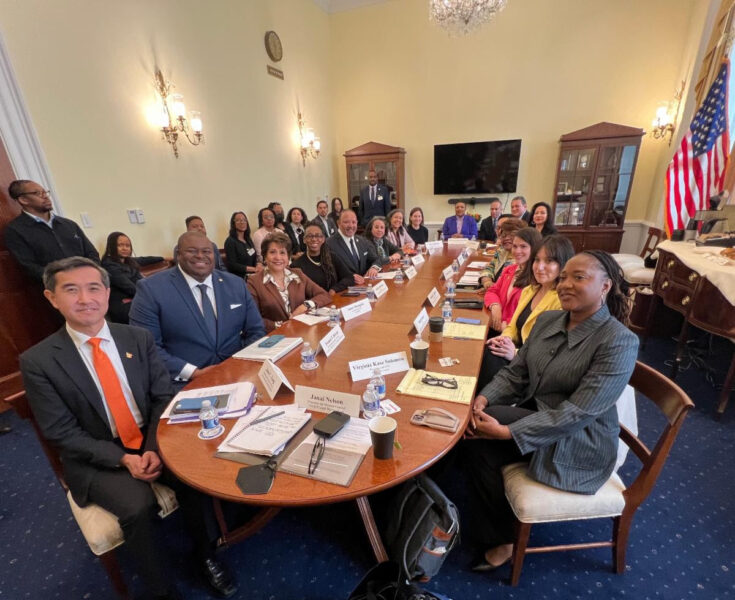
House Minority Leader Hakeem Jeffries, D-N.Y, in dark jacket at the head of the table, and members of the Demand Diversity Roundtable met on Capitol Hill on Feb. 25.
“When a government in power can use its power, can intimidate people into going back to the days of discrimination, and then to create a smokescreen and a cover story that diversity, equity and inclusion is, in and of itself, a discriminatory practice. Nothing turns my stomach — this twisted and evil logic. Because it’s twisted.
“So we welcome what you write (as long as you write it truthful.) As long as you quote our reports. . . . we’ve been having a lot of discussions about the appropriate way to include journalists — organizations of journalists, journalists organizations into this conversation about diversity, . . . “
NABJ and NNPA did not respond to requests for comment.
However, NABJ leaders, and their counterparts in other journalists-of-color associations have indicated that training their members, particularly for middle management jobs, is more of a priority than joining forces with those resisting the anti-diversity movement. They said as much in a March forum called “The State of Diversity in Journalism” (scroll down), held at Loyola University New Orleans.
At a March board of directors meeting, NABJ leaders outlined a strategy that involved finding ways around the backlash against diversity, equity and inclusion, rather than protesting it (scroll down).
NABJ Executive Director Drew Berry said then that the anti-DEI backlash means the organization must think about “how we have to market ourselves differently and how we write contracts and things like that,” as well as seeking non-media sponsors and multiple revenue streams and burnishing relationships.
Those responses differ from where the association stood in 2011, when, frustrated by job losses in its membership, setbacks in diversity efforts and a perceived decline in news that benefits African American communities, then-NABJ President Gregory H. Lee Jr. said the association would reach out to elected officials as it sought allies to reverse these trends.
“NABJ’s mission is to connect with the black community. The community involves pastors, school teachers, lawyers and yes even politicians,” Lee told Journal-isms then.
Benjamin Chavis, DMin, president of NNPA, whose members pride themselves on their activist tradition, did not directly address joining forces with other pro-DEI groups at an April 30 Journal-isms Roundtable on lessons for journalists from the civil rights movement.
But Chavis delivered a pointed reminder of what he called Black newsrooms’ unique responsibility.
“The role of journalists, Black journalists, is different from the role of white journalists,” he said, arguing that from the civil rights movement to the present day, “we live in a society that is permeated by white supremacy. Those laws . . . the society doesn’t give the quality of life or the humanity of Black people what they deserve. And that humanity is only going to get the coverage, only going to get the definition if we do it ourselves.”
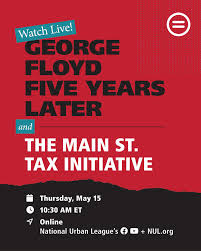 In its George Floyd report, the League said, “Despite challenges and headwinds coming our way, we are doubling down on the fight for a more equitable and just world, where our classrooms, offices, and boardrooms reflect who America is. Today, many Americans feel the same.”
In its George Floyd report, the League said, “Despite challenges and headwinds coming our way, we are doubling down on the fight for a more equitable and just world, where our classrooms, offices, and boardrooms reflect who America is. Today, many Americans feel the same.”
It offered three ways “you can protect yourself over the next four years”:
- “Know your rights . . . .
- “Register and consistently check your voter registration . . . .
- “Support organizations in the good fight . . . . “
“Key reforms” urged in “The Main St. Tax Initiative” include:
- “Direct tax cuts and fully refundable credits for workers and families earning under $100,000
- “Permanently expanded Child Tax Credit (CTC) and Earned Income Tax Credit (EITC)
- “Restoration of the full State and Local Tax (SALT) deduction
- “Expanded support for affordable housing and new home construction
- “A “Fair Deal for America Tax” on billionaires to rebalance the tax burden
- “Incentives for small business growth and investment in underserved communities.”
—————————————-
- Jason Armesto, Atlanta Journal-Constitution: Protesters rally to save Black studies major at Kennesaw State University
- Michael C. Bender and Michael S. Schmidt, New York Times: Trump Administration Escalates Harvard Feud With New Justice Dept. Investigation [into affirmaive action]
- Black Press of America: Target Boycotts and its Effect on Both Sides of the Black Dollar (May 2)
- William Brangham, “PBS News Hour”: Ohio students face changes on campus as new state law rolls back diversity initiatives
- Stacy M. Brown, Black Press USA: Target CEO Rakes In $20.4M as Boycott Deepens and Black Leaders Demand Accountability (April 30)
- Becky Z. Dernbach, Sahel Journal: ‘I never left this block’: How Minneapolis teacher Marcia Howard became a steward of George Floyd Square
- Rasmitha Edupuganti, Daily Texan: Director of Advocacy & Belonging recognizes power of journalism, diversity of the Texan (May 11)
- Emmanuel Felton, Washington Post: Trump DEI policies threaten millions in scholarships raised by Black doctors
- Niko Gallogly, New York Times: Has Your Company Changed Its D.E.I. Policies? We Want to Hear From You.
- Jocelyn Gecker and Linley Sanders, Associated Press: Americans are divided over DEI programs on college campuses, an AP-NORC poll finds
- Mathias Hammer, Semafor: State restricts LGBT-related terms (May 16)
- Carson Hartzog, Minnesota Star Tribune: Target CEO acknowledges silence from leadership has created uncertainty among workers (May 6)
- Juliana Menasce Horowitz, Kiana Cox and Kiley Hurst, Pew Research Center: Views of Race, Policing and Black Lives Matter in the 5 Years Since George Floyd’s Killing
- Journal-isms: What ‘The Movement’ Can Teach Journalists (May 5)
- David A. Lieb, Associated Press: As Trump targets DEI, Republican-led states intensify efforts to stamp it out
- Andy Mannix and Jeff Day, Minnesota Star Tribune: ‘It behooves us to be prepared’: Walz, other Minnesota agencies weigh in on rumors Trump will pardon Derek Chauvin
- Cela Migan, NBC News: Black college seniors graduating into soft labor market and reduced DEI practices
- Mark H. Morial, Chicago Sun-Times: Five years after George Floyd’s murder, National Urban League presses on for racial justice
- National Hispanic Media Coalition: Demand Diversity Roundtable Meets with House Democratic Leader Hakeem Jeffries (Feb. 26)
- Ryan Quinn, Inside Higher Ed: Waivers Let Some North Carolina Majors Keep ‘DEI’ Requirements (May 16)
- Ricardo Sandoval-Palos and Lila LaHood, San Francisco Public Press: Audience Trust Essential Amid Attacks on Media, DEI and Democracy, PBS Public Editor Says
- Maya Stahl, Chronicle of Higher Education: New State Laws Target DEI, Struggling Academic Programs, and Tenure (May 5)
Richard Prince’s Journal-isms originates from Washington. It began in print before most of us knew what the internet was, and it would like to be referred to as a “column.” Any views expressed in the column are those of the person or organization quoted and not those of any other entity. Send tips, comments and concerns to Richard Prince at journal-isms+owner@
View previous columns (after Feb. 13, 2016).
View previous columns (before Feb. 13, 2016)
- Diversity’s Greatest Hits, 2018 (Jan. 4, 2019)
- Book Notes: Is Taking a Knee Really All That? (Dec. 20, 2018)
- Book Notes: Challenging ’45’ and Proudly Telling the Story (Dec. 18, 2018)
- Book Notes: Get Down With the Legends! (Dec. 11, 2018)
- Journalist Richard Prince w/Joe Madison (Sirius XM, April 18, 2018) (podcast)
- Richard Prince (journalist) (Wikipedia entry)
- February 2018 Podcast: Richard “Dick” Prince on the need for newsroom diversity (Gabriel Greschler, Student Press Law Center, Feb. 26, 2018)
- An advocate for diversity in the media is still pressing for representation, (Courtland Milloy, Washington Post, Nov. 28, 2017)
- Morgan Global Journalism Review: Journal-isms Journeys On (Aug. 31, 2017)
- Journal-isms’ Richard Prince Wants Your Ideas (FishbowlDC, Feb. 26, 2016)
-
Richard Prince with Charlayne Hunter-Gault, “PBS NewsHour,” “What stagnant diversity means for America’s newsrooms” (Dec. 15, 2015)
- Book Notes: Journalists Follow Their Passions
- Book Notes: Journalists Who Rocked Their World

